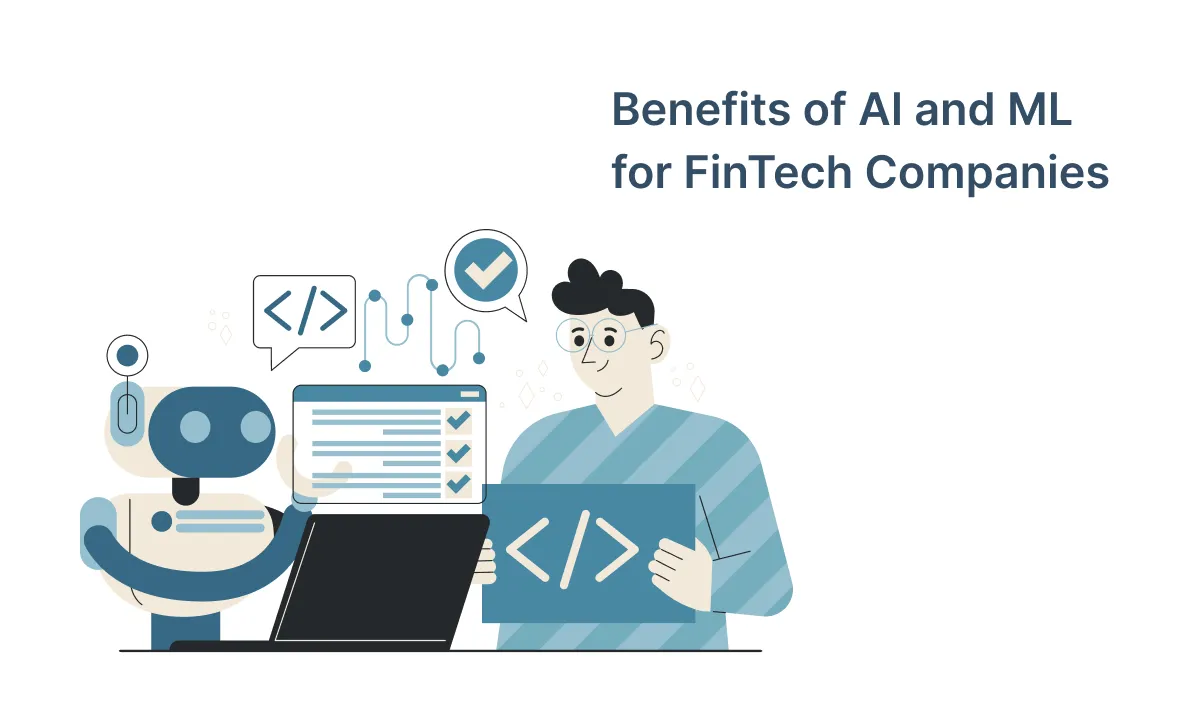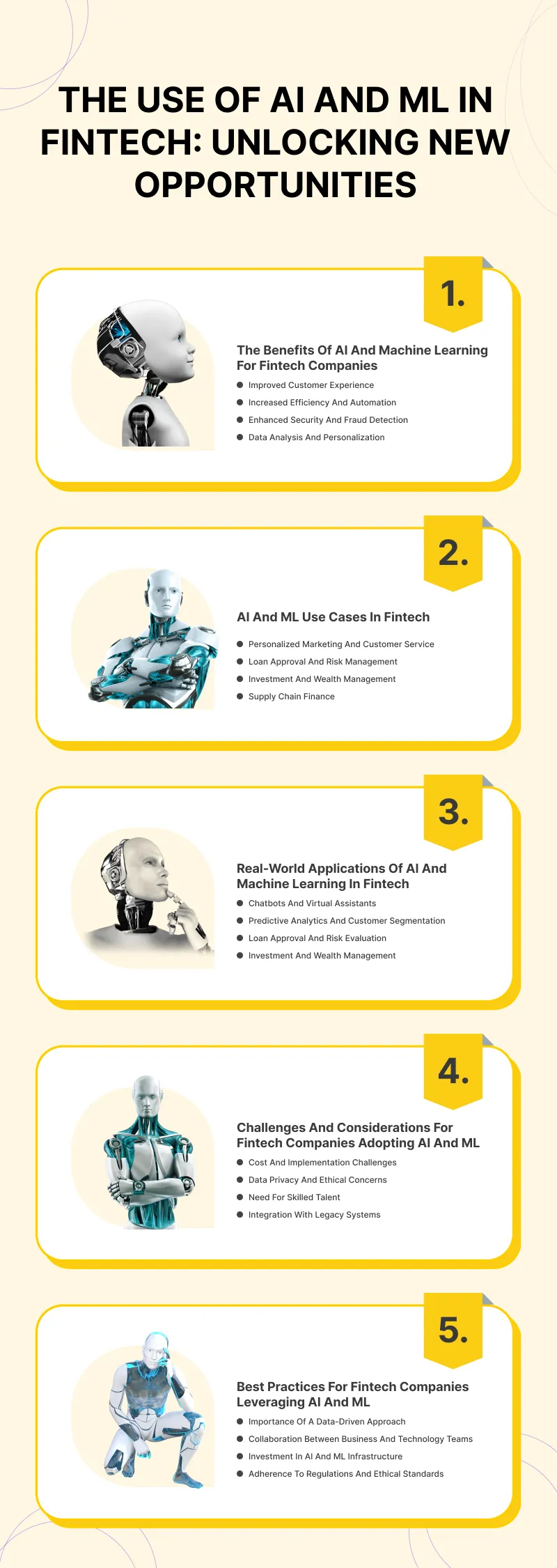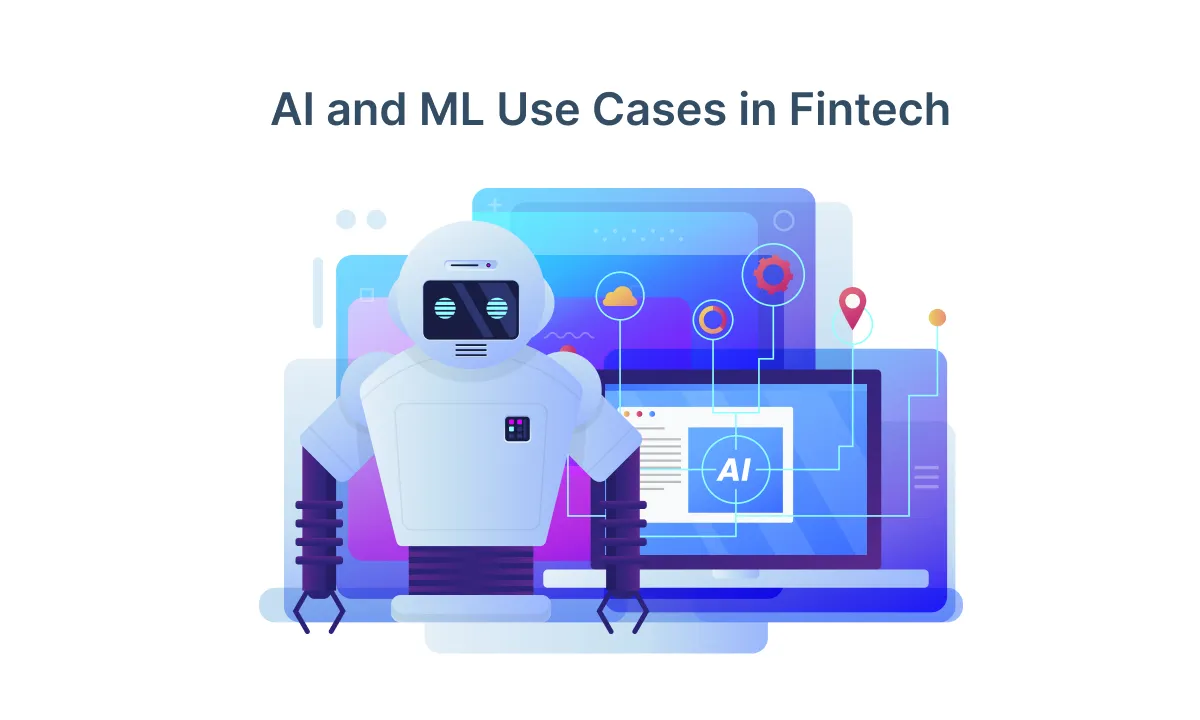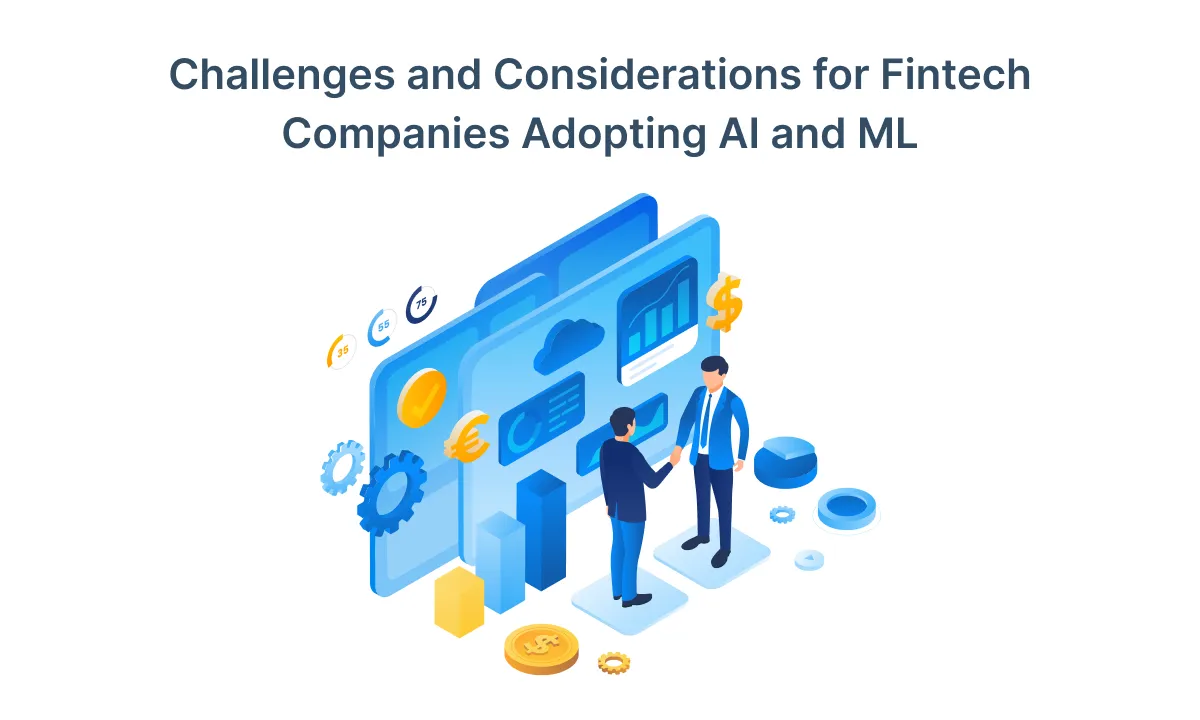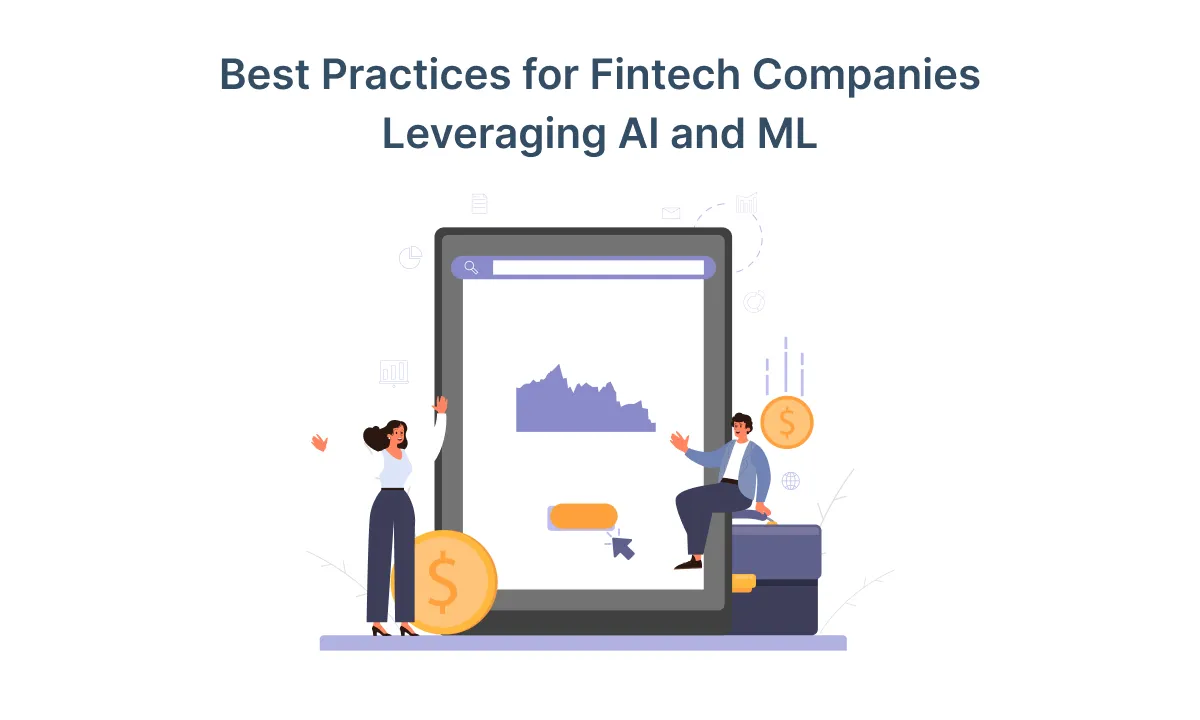The market for AI in Fintech grew from $9.15 billion in 2022 to $11.59 billion in 2023 at a compound annual growth rate (CAGR) of 26.8%. This clearly shows AI and ML in Fintech have fundamentally changed the banking sector by introducing a new level of security, efficiency, and personalized services.
To match the pace of the financial sector and set the bar higher for their clients, fintech app development companies are leveraging AI and ML.
This blog aims to analyze the benefits of AI and ML in fintech application development, real-world applications of these technologies, and best practices for effectively deploying them. We’ll also discuss fintech companies’ challenges when integrating AI and ML and advise on overcoming them. If you’re a financial app developer or simply interested in learning more about AI and ML in banking, keep reading since this blog will provide incisive analysis and helpful advice.
We create smart virtual assistants that engage customers conversationally
The Benefits of AI and Machine Learning for Fintech Companies
- Improved Customer Experience: Fintech app development services may use AI and ML to offer tailored customer care, which enhances the entire customer experience. For instance, AI-powered chatbots respond to customer questions quickly and accurately, speeding up service and improving client happiness. Furthermore, Artificial Intelligence in Fintech may use consumer data analysis to understand their preferences and demands, enabling fintech businesses to customize their services and products to each customer’s particular requirements.
- Increased Efficiency and Automation: Artificial and machine learning in Fintech can automate manual and routine operations, freeing time and resources for more strategic efforts. Using AI, for instance, can speed up the time it takes to manually enter and analyze enormous amounts of data by processing it in real-time. This means greater efficiency and lower costs for a financial app development company.
- Enhanced Security and Fraud Detection: By analyzing vast volumes of data to spot odd or suspect activities, AI and ML in Fintech can assist banking software development companies improve security and prevent fraud. AI can track real-time transactions and identify those that appear strange or perhaps fraudulent, enabling fintech companies to respond quickly to stop losses.
- Data Analysis and Personalization: Fintech mobile application development companies can utilize AI and ML to evaluate client data, including financial history, spending trends, and other pertinent information, to understand their requirements and preferences better. The personalization of financial products during fintech application development and services made possible by this data will increase client happiness and engagement. For instance, using a customer’s risk tolerance, investment objectives, and current portfolio, AI can be used to suggest tailored investment portfolios.
- DeFi Development Services: Additionally, fintech companies can leverage AI and ML to enhance their offerings in decentralized finance (DeFi). Services such as smart contracts development, Solidity programming, DApp development, digital token creation, dedicated Solidity developers, CrowdSale, and exchange platforms are becoming essential. This integration enables seamless transactions, higher transparency, and improved user experiences.
Also Read – Top FinTech Software Development Companies 2024
Also Read: What Is The Role Of Artificial Intelligence In The Financial Sector?
AI and ML Use Cases in Fintech
- Personalized Marketing and Customer Service: Chatbots and virtual assistants powered by AI can be used to offer round-the-clock customer help, promptly addressing questions from clients and resolving problems. Customers may be more satisfied as a result of shorter response times. AI in Fintech can also use customer data, like prior purchases, search histories, and social media activity, to give individualized marketing and recommendations, resulting in a more exciting customer experience.
- Loan Approval and Risk Management: Artificial intelligence in Fintech can process enormous amounts of data to evaluate a borrower’s creditworthiness and spot potential dangers. For instance, the risk that a borrower will fail on a loan can be calculated using AI or machine learning in fintech by looking at their financial history, employment status, and other characteristics. Because of this, there is a lower chance of losses for fintech companies when making lending decisions.
- Investment and Wealth Management: By evaluating market data and taking into account characteristics like a person’s investment goals, risk tolerance etc. AI can assist fintech software development companies in India in providing individualized investment advice to customers. Customer satisfaction may increase as a result, and investments may perform better.
- Supply Chain Finance: Automating the financing of invoices using AI and ML in fintech can save time and effort by removing the need for human processing and enhancing the speed and precision of financing choices. To check the authenticity of invoice, AI may validate it, look for duplication, and carry out other checks, increasing the overall effectiveness of the financing process. Therefore, fintech application developers can help you increase a company’s cash flow, enabling it to expand and invest in its operations.
Our AI solutions provide instant credit insights and identify fraud faster.
Real-world Applications of AI and Machine Learning in Fintech
- Chatbots and Virtual Assistants: Top banking software companies can utilize AI-powered chatbots and virtual assistants to offer efficient and convenient customer support. These systems can deal with simple consumer queries, freeing human agents to deal with more complicated problems. Additionally, chatbots and virtual assistants can be configured to offer round-the-clock assistance, enhancing customer satisfaction and response times.
- Predictive Analytics and Customer Segmentation: AI and ML can be used by fintech app developers to evaluate customer data to forecast future behavior and segment customers into various categories based on their requirements and preferences. Personalizing financial products and services with the help of this data will increase client happiness and engagement.
- Loan Approval and Risk Evaluation: Financial app development companies can use AI and ML to automate the loan approval process, eliminating manual work and enhancing the speed and accuracy of loan approvals. For instance, AI in Fintech can examine borrowers’ employment history, financial background, and other details to assess their loan default risk. As a result, the risk of losses is decreased, and fintech application development companies can help make better loan selections.
- Investment and Wealth Management: Using extensive market data analysis and taking into account variables like a person’s investment objectives, risk tolerance, and present portfolio, artificial and machine learning in fintech can be used to offer individualized investment suggestions to clients. Fintech companies benefit from better investment performance and more client satisfaction as a result of this. Furthermore, portfolio management can be automated and optimized using AI, which will save time and effort.
Also Read: How Artificial Intelligence Is Redefining Success Of Digital Transformation Strategies?
Challenges and Considerations for Fintech Companies Adopting AI and ML
- Cost and Implementation Challenges: Firms should carefully assess their budgets and resources before investing in AI and ML technology for fintech application development because doing so can be expensive. Additionally complicated and time-consuming, putting these technologies into practice requires much work and resources. Fintech app developers and companies involved in the fintech industry must carefully plan its implementation and ensure they have the finance, technology, and staff they need to thrive.
- Data Privacy and Ethical Concerns: Fintech app development companies must take into account the ethical ramifications of accessing client data when using AI and ML. This entails protecting the security and privacy of client information and making appropriate, open use of such information. For instance, fintech application development companies must ensure their AI algorithms don’t discriminate against specific groups or make immoral or illegal conclusions.
- Need for Skilled Talent: AI and ML in fintech demand specialized knowledge and expertise, including those of data scientists, machine learning engineers, and other technical experts. When considering whether to implement these technologies, fintech app developers and organizations must carefully assess the availability of these skills, and they may need to spend in training and development to strengthen their internal capabilities. Additionally, because there is a strong need for these abilities and there might be a fierce rivalry for competent workers, they must be ready to fight for talent in a highly competitive market.
- Integration with Legacy Systems: Integrating technologies like machine learning and artificial intelligence in Fintech can be complex for organizations because many of their legacy systems and procedures are intricate and deeply ingrained. This necessitates a cautious and planned approach, including creating a plan to integrate new technology with current systems and procedures smoothly. The effects of these modifications on operations and customers must be taken into account by fintech app developers, and they must also make sure that the integration process is open and well-communicated to stakeholders.
Also Read: The convergence of AI/ML and Wearables: What’s in store for the Healthcare Industry
We can help you build automated trading systems
Best Practices for Fintech Companies Leveraging AI and ML
- Importance of a Data-Driven Approach: A data-driven strategy is crucial for businesses to fully benefit from AI and ML in Fintech. This entails gathering, storing, and utilizing a sizable amount of data to train and enhance AI models and ensure that the data is reliable, pertinent, and unbiased. Additionally, to use data to inform their decisions and assess the effectiveness of their AI and ML initiatives, fintech app developers and organizations must have a comprehensive grasp of the business issues they hope to tackle with these technologies. In particular, AI and ML in banking and insurance rely heavily on this approach to improve decision-making processes, mitigate risks, and enhance customer experiences.
Also Read: How Has Blockchain Evolved FinTech For 2024?
- Collaboration between Business and Technology Teams: Effective AI and machine learning in fintech initiatives require tight collaboration between Business and Technology Teams. While technology teams provide the technical know-how and tools needed to deploy AI and ML solutions, business teams are responsible for providing the domain expertise and business needs that drive AI and ML fintech application development. To accomplish similar objectives and get the greatest results, fintech organizations must ensure their teams collaborate closely.
- Investment in AI and ML Infrastructure: AI in fintech demands a large investment in manpower, infrastructure, and technology. To ensure that their AI and ML initiatives are effective, fintech organizations must carefully analyze their investments and deploy resources. This includes creating and maintaining machine learning and artificial intelligence in fintech models in addition to spending money on hardware, software, and cloud services.
- Adherence to Regulations and Ethical Standards: Fintech application development companies must adhere to legal requirements and moral standards while using AI and ML. It means they must ensure that these technologies are used responsibly while following all the applicable rules and laws, such as data privacy and anti-discrimination laws. Fintech app developers should also consider ethical standards and take the necessary steps so that their AI systems don’t violate the rights of their customers or other stakeholders.
Automate repetitive finance tasks efficiently using ML
Conclusion
The financial sector is changing due to advances in automation, efficiency, security, and fraud detection made possible by machine learning or artificial intelligence in the fintech sector. Chatbots and virtual assistants, predictive analytics and client segmentation, loan approval and risk assessment, investment, and wealth management are examples of how AI and ML are used in the financial industry in real-world settings.
With ongoing developments and the emergence of new applications, AI and ML in fintech appear to have a promising future. Companies in the fintech industry that efficiently use AI and ML will have a competitive advantage and be better able to serve their clients.
If a fintech application development company wants to use AI and ML, it should take a data-driven strategy, encourage close communication between the business and technical teams, invest in AI and ML infrastructure, and uphold ethical and legal norms. These best practices can assist fintech organizations in maximizing the power of AI and ML and succeeding in the quickly changing financial market.


